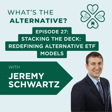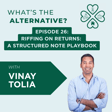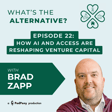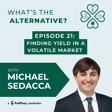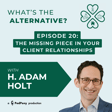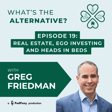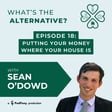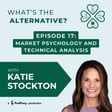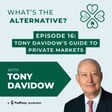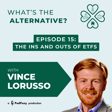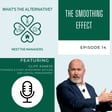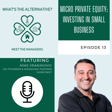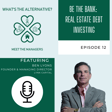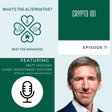
What's the Alternative? | Episode 5 | Venture Capital Reimagined featuring Dave Thornton
Welcome to Banrion Capital Management’s What’s the Alternative Podcast! Join host Shana Orczyk Sissel, the “Queen of Alternatives” Founder & CEO of Banrion Capital Management, as she interviews leaders in the alternative investment space. Learn more about their firms, their passions and about the many different ways investors can use alternative investments to add value in their investment portfolios.
In this episode "Venture Capital Reimagined", Shana is joined by Dave Thornton, Co-Founder, CEO & CIO at Vested. Vested is pioneering index-like exposure to the VC asset class, across company stage, sector, and founding year. Vested acquires its exposure by providing funding to the departing employees of VC-backed companies, who find themselves in the acute distress of having 90 days to find the money to exercise their expiring stock options. This revolutionary approach allows Vested to provide liquidity for startup employees and along the way democratize access for investors to access the beta of venture capital unlike it’s ever been done before.
Dave is Vested’s Chief Executive Officer and Chief Investment Officer. For the last 11 years, Dave has been a serial entrepreneur. His most notable accomplishments include the founding and successful sale of PatientFinder, and his collaboration with Emilio Seijo (a Principal Quantitative Strategist at Vested) in the creation of a real-time illiquid asset pricing model which is algo-trading a $300M book at a name-brand bank. Dave also spent time building the systems at a hedge fund within Citigroup, and worked as a Program Manager at Microsoft. Dave received a BAS in Computer Science from the University of Pennsylvania’s School of Engineering and Applied Science and a BS in Economics with a concentration in Decision Processes from the University of Pennsylvania’s Wharton School. Dave earned a JD from Georgetown University.
Learn More About Vested: Vested Investor Site
LinkedIn: Dave J Thornton
Learn More About Banrion: Banrion Capital Management
Connect with Shana on LinkedIn: Shana Orczyk Sissel
Connect with Shana 𝕏: @shanas621
Important Disclosures:
The opinions expressed on the “What’s the Alternative Podcast” are for general informational purposes only and are not intended to provide specific advice or recommendations for any individual or on any specific security.
It is only intended to provide education about the financial industry. To determine which investments may be appropriate for you, consult your financial advisor prior to investing. Any past performance discussed during this program is no guarantee of future results.
The guests featured on this program are participants on Banrion Capital Management’s platform. As such Banrion may receive payment for their participation as a platform partner.
Any indices referenced for comparison are unmanaged and cannot be invested into directly. As always please remember investing involves risk and possible loss of principal capital; please seek advice from a licensed professional.
Investments are not FDIC-insured, nor are they deposits of or guaranteed by a bank or any other entity, so they may lose value.
Investors should carefully consider investment objectives, risks, charges and expenses. This and other important information is contained in the fund prospectuses and summary prospectuses, which can be obtained from a financial professional and should be read carefully before investing.
Statements attributed to an individua

